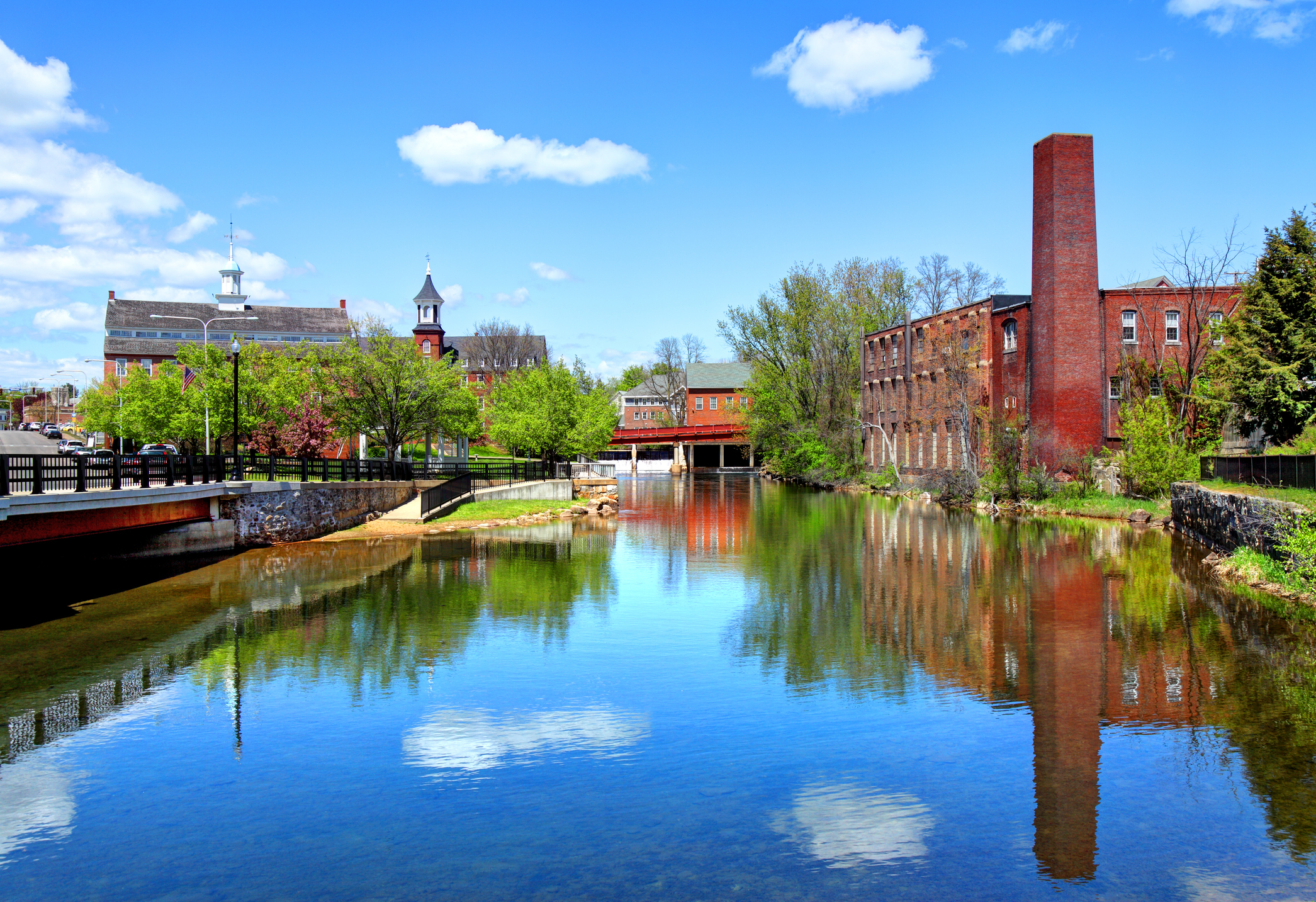The Six Best Places to Retire in New England
Thinking about a move to New England for retirement? Here are the best places to land based on quality of life and other criteria.


Profit and prosper with the best of Kiplinger's advice on investing, taxes, retirement, personal finance and much more. Delivered daily. Enter your email in the box and click Sign Me Up.
You are now subscribed
Your newsletter sign-up was successful
Want to add more newsletters?

Delivered daily
Kiplinger Today
Profit and prosper with the best of Kiplinger's advice on investing, taxes, retirement, personal finance and much more delivered daily. Smart money moves start here.

Sent five days a week
Kiplinger A Step Ahead
Get practical help to make better financial decisions in your everyday life, from spending to savings on top deals.

Delivered daily
Kiplinger Closing Bell
Get today's biggest financial and investing headlines delivered to your inbox every day the U.S. stock market is open.

Sent twice a week
Kiplinger Adviser Intel
Financial pros across the country share best practices and fresh tactics to preserve and grow your wealth.

Delivered weekly
Kiplinger Tax Tips
Trim your federal and state tax bills with practical tax-planning and tax-cutting strategies.

Sent twice a week
Kiplinger Retirement Tips
Your twice-a-week guide to planning and enjoying a financially secure and richly rewarding retirement

Sent bimonthly.
Kiplinger Adviser Angle
Insights for advisers, wealth managers and other financial professionals.

Sent twice a week
Kiplinger Investing Weekly
Your twice-a-week roundup of promising stocks, funds, companies and industries you should consider, ones you should avoid, and why.

Sent weekly for six weeks
Kiplinger Invest for Retirement
Your step-by-step six-part series on how to invest for retirement, from devising a successful strategy to exactly which investments to choose.
Turning leaves for fall. Blankets of snow for winter. Popping blooms for spring. White-sand beaches for summer. Although it's not one of the cheapest places to live, every season brings a new reason to love New England.
The area's typically high costs, unfavorable tax policies and harsh winters are common deterrents for retirees. However, some New England states have overcome potential turn-offs and drawn an influx of newly retired residents. In 2024, Vermont and Rhode Island were among the top 10 states people moved to for retirement, according to United Van Lines' 48th Annual National Movers Study.
If you're pondering a move to New England while reviewing your retirement checklist, we suggest you consider the following spots. We highlighted one great retirement destination in every state, taking into account living costs, safety, median incomes and poverty rates, as well as residents' sense of well-being and the availability of recreational and healthcare facilities.
Our six choices are in Connecticut, Maine, Massachusetts, New Hampshire, Rhode Island and Vermont.
The list is ordered alphabetically by state. See "How We Picked the Best Places to Retire" at the end of the list for details on our data sources and methodology.

1. Wallingford, Connecticut
- City population: 44,606
- Share of population 65+: 17.3%
- Cost of living: 109.2 or 9.2% higher than the US average
- Average income: $62,640
- Well-being score: 66
- Connecticut State Tax Guide
Like much of the Northeast, Connecticut is known to be a high-cost area, and Wallingford, Connecticut is no different. This cozy town is blessed with many excellent healthcare options, recreational opportunities, and a strong sense of community. It's easy to fit in in Wallingford. Top-rated Gaylord Hospital takes your health seriously, and the senior center has a vaccine clinic, hearing and vision clinic, and fitness classes, as well as activities like billiards, cards, dancing, pickleball and shuffleboard.
In town, retirees can enjoy amenities such as the public library or the Paul Mellon Arts Center and the Toyota Oakdale Theater. Dine out at local hotspots like Boggs, Serafino's Ristorante Italiano or Arles. For the night owls, check out Center Street Brewing Company and New England Cider Company, or spend an afternoon at the vineyard — Paradise Hills Vineyard and Winery and Gouveia Vineyard.

2. Portland, Maine
- City population: 69,511
- Share of population 65+: 15.3%
- Cost of living: 112.5 or 12.5% above the national average
- Average income: $66,109
- Well-being score: 70
- Maine State Tax Guide
The largest city in Maine, Portland offers a lively downtown and plenty of urban-esque amenities amidst the great outdoors of the Pine Tree State. You can enjoy museums, theaters and an array of eclectic dining. The flagship L.L. Bean store in nearby Freeport is a must-see for many visitors, but resident shoppers also flock to Portland’s unique boutiques and outlets.
All the while, you’re never too far from the area's many beaches. That means ample opportunity to lounge on the shore or dive into water-based activities including fishing, kayaking, sailing and even surfing. And of course, hiking and biking trails abound — perfect in the (much) colder months, too, for cross-country skiing and snowshoeing.

3. Pittsfield, Massachusetts
- City population: 43,890
- Share of population 65+: 19.9%
- Cost of living: 95.9 or 4.1% below the national average
- Average income: $59,522
- Well-being score: 59
- Massachusetts State Tax Guide
New England is notoriously expensive, but Pittsfield, located in the western part of Massachusetts, offers a small pocket of relative affordability — more reasonably priced than Boston and Cambridge, where living costs are, respectively, 50.1% and 44.7% above the U.S. average. Cost of living in Pittsfield is 95.9, or 4.1% lower than the national average. Housing in Pittsfield is also notably affordable. The average Pittsfield home value is $263,800, which is significantly lower than the U.S. median value of $338,100. You'll pay upwards of $656,500 in Boston.
Leaf peeping in the fall may be enough to draw you to the Berkshires. But you have plenty to enjoy all year round, including excellent sites for camping, fishing, hiking and skiing. Nearby, enjoy musical performances at the Tanglewood Music Center, the summer home of the Boston Symphony Orchestra. There’s also world-class art at the Clark Art Institute in Williamstown and the Massachusetts Museum of Contemporary Art (MASS MoCA, for short) in North Adams.
Pittsfield, Massachusetts, also made our list of best cold weather places to retire.

4. Laconia, New Hampshire
- City population: 16,654
- Share of population 65+: 21.1%
- Cost of living: 102.2 or 2.2% higher than the U.S. average.
- Average income: $23,444
- Well-being score: 52
- New Hampshire State Tax Guide
Tucked between Lake Winnipesaukee and Winnisquam Lake, Laconia has been dubbed "The City on the Lake," the home city to New Hampshire's Lakes Region. That means plenty of beaches and water-related activities for you in the warmer months. Other outdoor recreation abounds nearby, too. Gunstock Mountain Resort in neighboring Gilford, for example, offers camping, ziplining and snow sports, as well as fairs, events and dining options.
Local crime may be worth noting: Laconia violent crime rate is 24.8 (down 2 points from 2023). The U.S. average is 22.7. Lakeport, Laconia North and Interlaken Park/Pendleton Beach are the safest Laconia neighborhoods.
Plus, the Granite State's tax situation for retirees is solid, too. Social Security benefits are not taxed, and income from retirement plans is exempt from New Hampshire's interest and dividends tax.
*For Belknap County, where Laconia is located.

5. Providence, Rhode Island
- City population: 188,812
- Share of population 65+: 14.9%
- Cost of living: 108.8 or 8.8% above the national average
- Average income: $55,787
- Well-being score: 63
- Rhode Island State Tax Guide
Home to Ivy League Brown University and the world-renowned Rhode Island School of Design, as well as a handful of other colleges, Providence can be a great fit for retired intellectuals and artists. They'll have no shortage of things to do, with the schools offering gallery nights, performing arts events, educational opportunities and more. And the schools' presence has helped draw a variety of restaurants and businesses to the area, too.
Unfortunately, higher-than-average tax rates and home values can be prohibitive throughout the tiny state. The average effective property tax rate in Rhode Island is 15.88%, and the average Providence home value is $350,800, compared to the national average home value of $338,100.

6. Burlington, Vermont
- City population: 44,703
- Share of population 65+: 12.1%
- Cost of living: 112.4 or 12.4% above the national average
- Average income: $59,331
- Well-being score: 74
- Vermont State Tax Guide
This small mountain city on the shores of Lake Champlain is a picturesque setting for tree-hugging retirees. Outdoor recreation is plentiful with miles of hiking and biking paths, nearby beaches where you can swim, kayak or paddleboard in the warmer months, and numerous skiing options. An eco-friendly vibe permeates the town, from the businesses bolstering the city's economy, such as household-products maker Seventh Generation, to the local food movement feeding the neighborhood.
But being green isn't easy on your wallet. Taxes and living costs are high. While the average home value is $338,100 for the U.S., it climbs to $478,900 in Burlington. Rent will set you back about $2,250 per month. The median cost of a semi-private room in a nursing home in Burlington was a hefty $201,845 per year in 2025, according to the American Council on Aging.
But at least you can save money on academic pursuits. The University of Vermont will cover tuition costs for state residents aged 65 and older who wish to take a class, even those for credit. Read more about college classes available for seniors in our list of free (or cheap) college for seniors and retirees in all 50 states.

How we picked the best places to retire
To pinpoint one great retirement destination in each state, we weighed a number of factors:
- Cost of living comes from BestPlaces.net
- Average income for population 65+ comes from Point2homes.com.
- Household incomes, poverty rates and number of healthcare facilities are from the U.S. Census Bureau.
- Community well-being and physical well-being scores are provided by digital health company Sharecare, in collaboration with Gallup. These are two of the five elements of well-being that make up the overall Gallup-Sharecare Well-Being Index. (The other three elements are purpose, social and financial well-being.) The index is calculated on a scale of 0 to 100 and based on more than 2.5 million nationally representative surveys. Community well-being is defined as "liking where you live, feeling safe and having pride in your community." Physical well-being is "having good health and enough energy to get things done daily." We display the community score for each place we chose.
- Population data, including the percentage of the population that is age 65 and older, is also provided by the Census Bureau. The figures are highlighted in these rankings for the benefit of readers, but were not factors in our methodology for ranking the best places to retire.
Related Content
Profit and prosper with the best of Kiplinger's advice on investing, taxes, retirement, personal finance and much more. Delivered daily. Enter your email in the box and click Sign Me Up.

Rapacon joined Kiplinger in October 2007 as a reporter with Kiplinger's Personal Finance magazine and became an online editor for Kiplinger.com in June 2010. She previously served as editor of the "Starting Out" column, focusing on personal finance advice for people in their twenties and thirties.
Before joining Kiplinger, Rapacon worked as a senior research associate at b2b publishing house Judy Diamond Associates. She holds a B.A. degree in English from the George Washington University.
- Kathryn PomroyContributor
- Erin BendigPersonal Finance Writer
-
 How Much It Costs to Host a Super Bowl Party in 2026
How Much It Costs to Host a Super Bowl Party in 2026Hosting a Super Bowl party in 2026 could cost you. Here's a breakdown of food, drink and entertainment costs — plus ways to save.
-
 3 Reasons to Use a 5-Year CD As You Approach Retirement
3 Reasons to Use a 5-Year CD As You Approach RetirementA five-year CD can help you reach other milestones as you approach retirement.
-
 Your Adult Kids Are Doing Fine. Is It Time To Spend Some of Their Inheritance?
Your Adult Kids Are Doing Fine. Is It Time To Spend Some of Their Inheritance?If your kids are successful, do they need an inheritance? Ask yourself these four questions before passing down another dollar.
-
 The 4 Estate Planning Documents Every High-Net-Worth Family Needs (Not Just a Will)
The 4 Estate Planning Documents Every High-Net-Worth Family Needs (Not Just a Will)The key to successful estate planning for HNW families isn't just drafting these four documents, but ensuring they're current and immediately accessible.
-
 Love and Legacy: What Couples Rarely Talk About (But Should)
Love and Legacy: What Couples Rarely Talk About (But Should)Couples who talk openly about finances, including estate planning, are more likely to head into retirement joyfully. How can you get the conversation going?
-
 We're 62 With $1.4 Million. I Want to Sell Our Beach House to Retire Now, But My Wife Wants to Keep It and Work Until 70.
We're 62 With $1.4 Million. I Want to Sell Our Beach House to Retire Now, But My Wife Wants to Keep It and Work Until 70.I want to sell the $610K vacation home and retire now, but my wife envisions a beach retirement in 8 years. We asked financial advisers to weigh in.
-
 How to Add a Pet Trust to Your Estate Plan: Don't Leave Your Best Friend to Chance
How to Add a Pet Trust to Your Estate Plan: Don't Leave Your Best Friend to ChanceAdding a pet trust to your estate plan can ensure your pets are properly looked after when you're no longer able to care for them. This is how to go about it.
-
 Want to Avoid Leaving Chaos in Your Wake? Don't Leave Behind an Outdated Estate Plan
Want to Avoid Leaving Chaos in Your Wake? Don't Leave Behind an Outdated Estate PlanAn outdated or incomplete estate plan could cause confusion for those handling your affairs at a difficult time. This guide highlights what to update and when.
-
 I'm a Financial Adviser: This Is Why I Became an Advocate for Fee-Only Financial Advice
I'm a Financial Adviser: This Is Why I Became an Advocate for Fee-Only Financial AdviceCan financial advisers who earn commissions on product sales give clients the best advice? For one professional, changing track was the clear choice.
-
 Quiz: Are You Ready for the 2026 401(k) Catch-Up Shakeup?
Quiz: Are You Ready for the 2026 401(k) Catch-Up Shakeup?Quiz If you are 50 or older and a high earner, these new catch-up rules fundamentally change how your "extra" retirement savings are taxed and reported.
-
 This Is How You Can Land a Job You'll Love
This Is How You Can Land a Job You'll Love"Work How You Are Wired" leads job seekers on a journey of self-discovery that could help them snag the job of their dreams.
